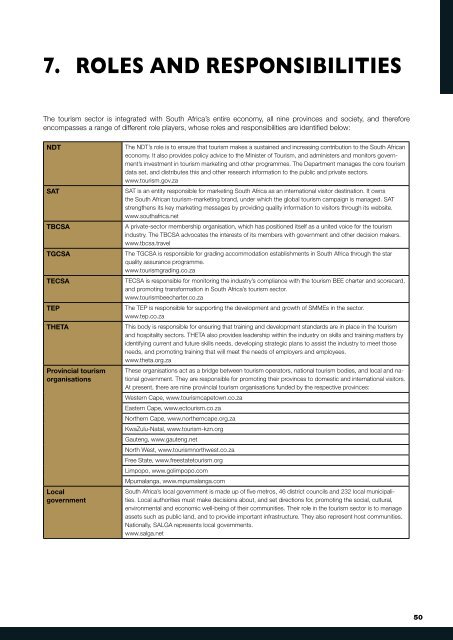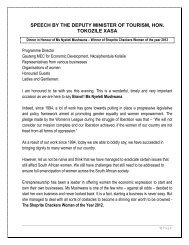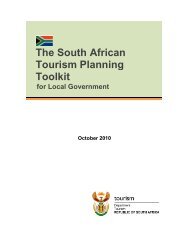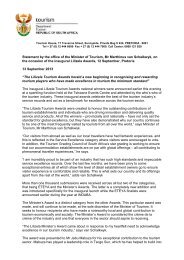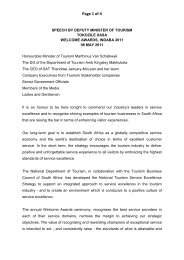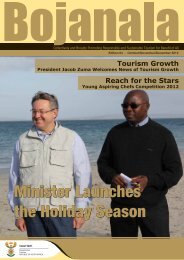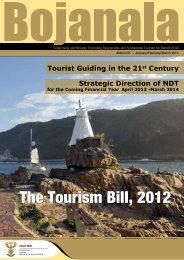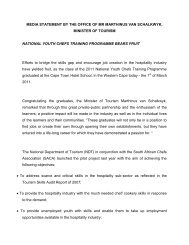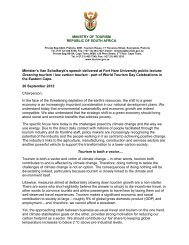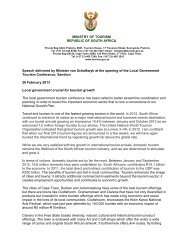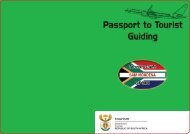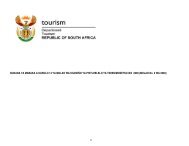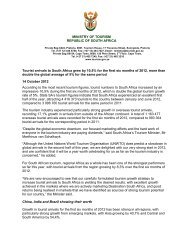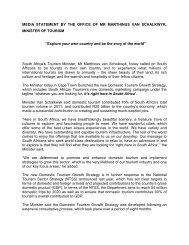National Tourism Sector Strategy - Department of Tourism
National Tourism Sector Strategy - Department of Tourism
National Tourism Sector Strategy - Department of Tourism
- No tags were found...
Create successful ePaper yourself
Turn your PDF publications into a flip-book with our unique Google optimized e-Paper software.
7. Roles and responsibilitiesThe tourism sector is integrated with South Africa’s entire economy, all nine provinces and society, and thereforeencompasses a range <strong>of</strong> different role players, whose roles and responsibilities are identified below:NDTSATTBCSATGCSATECSATEPTHETAProvincial tourismorganisationsLocalgovernmentThe NDT’s role is to ensure that tourism makes a sustained and increasing contribution to the South Africaneconomy. It also provides policy advice to the Minister <strong>of</strong> <strong>Tourism</strong>, and administers and monitors government’sinvestment in tourism marketing and other programmes. The <strong>Department</strong> manages the core tourismdata set, and distributes this and other research information to the public and private sectors.www.tourism.gov.zaSAT is an entity responsible for marketing South Africa as an international visitor destination. It ownsthe South African tourism-marketing brand, under which the global tourism campaign is managed. SATstrengthens its key marketing messages by providing quality information to visitors through its website.www.southafrica.netA private-sector membership organisation, which has positioned itself as a united voice for the tourismindustry. The TBCSA advocates the interests <strong>of</strong> its members with government and other decision makers.www.tbcsa.travelThe TGCSA is responsible for grading accommodation establishments in South Africa through the starquality assurance programme.www.tourismgrading.co.zaTECSA is responsible for monitoring the industry’s compliance with the tourism BEE charter and scorecard,and promoting transformation in South Africa’s tourism sector.www.tourismbeecharter.co.zaThe TEP is responsible for supporting the development and growth <strong>of</strong> SMMEs in the sector.www.tep.co.zaThis body is responsible for ensuring that training and development standards are in place in the tourismand hospitality sectors. THETA also provides leadership within the industry on skills and training matters byidentifying current and future skills needs, developing strategic plans to assist the industry to meet thoseneeds, and promoting training that will meet the needs <strong>of</strong> employers and employees.www.theta.org.zaThese organisations act as a bridge between tourism operators, national tourism bodies, and local and nationalgovernment. They are responsible for promoting their provinces to domestic and international visitors.At present, there are nine provincial tourism organisations funded by the respective provinces:Western Cape, www.tourismcapetown.co.zaEastern Cape, www.ectourism.co.zaNorthern Cape, www.northerncape.org.zaKwaZulu-Natal, www.tourism-kzn.orgGauteng, www.gauteng.netNorth West, www.tourismnorthwest.co.zaFree State, www.freestatetourism.orgLimpopo, www.golimpopo.comMpumalanga, www.mpumalanga.comSouth Africa’s local government is made up <strong>of</strong> five metros, 46 district councils and 232 local municipalities.Local authorities must make decisions about, and set directions for, promoting the social, cultural,environmental and economic well-being <strong>of</strong> their communities. Their role in the tourism sector is to manageassets such as public land, and to provide important infrastructure. They also represent host communities.<strong>National</strong>ly, SALGA represents local governments.www.salga.net50


